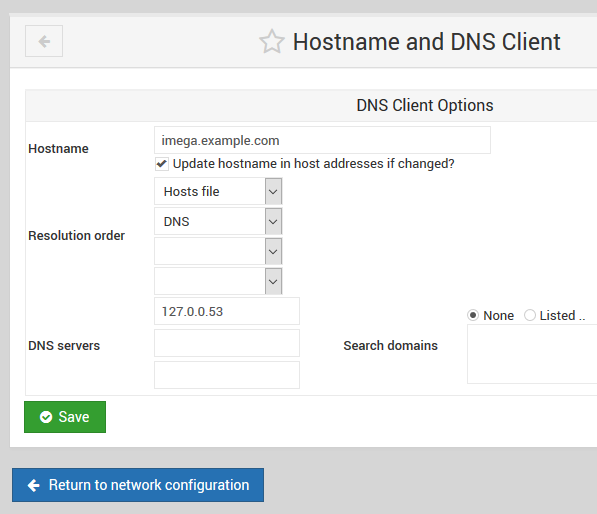iRedMail
revised: 27-Sep-2025
Perquisites:
- Basic Server (Ubuntu22.04 64bit with a minimum memory of 2Gb) with Webmin linked to a domain-name (eg example.com).
- Installed Firewall.
- Installed FTP server
Preparation: Two users will be created and will require passwords (see Create Strong Passwords): MySQL root and postmaster@[example.com]
Alternative and recommended reference: ubuntu-20-04-iredmail-server-installation
Step01: Create a Fully Qualified Doman Name (FQDN) that is the hostname + domainname together. [ Skip this if done in Basic Installation]
Via Webmin: Do this by entering Webmin (via https//[example.com]:10000) as root, then change the hostname via Webmin->Networking->Network Configuration and open the "Hostname and DNS Client" icon and enter the full hostname eg. imega.example.com whereby "imega" is the host and "example.com" is the domain.
Then save and "return to network configuration" and then "apply configuration".

Check the hostname by entering the PuTTy console as root and typing: hostname -f
The response should be something like "imega.example.com"
***[In case, iRedMail fails to accept your hostname], In Webmin->Networking->Network Configuration enter "host addresses" and verify that there's an entry, very similar to this:
Hostname: imega.example.com
Step02: Getting the latest iRedmail tarball and uploading to the home directory of a regular user
Download the latest iRedmail tarball
Using Filezilla with regular user’s name (eg.sammy) and password, upload the tarball [currently: iRedMail-1.6.4.tar.gz] to the server (see "FTP" tab)
Go back to the PuTTy console, logon as root, and go to the user home directory eg. sammy; type:
iRedMail Configuration
Now a graphic-like setup programme will start and one continues by entering the return key to accept.
For a thorough and appropriate description for the graphic dialogue that follows, please see this tutorial at Linode:Install Iredmail on Ubuntu
Note: This tutorial serves Debian servers as well as Ubuntu ones (Ubuntu is Debian-based)
Agreed to all the optional components – by pressing the Return key.
It is highly recommended to accept the Nginx Webserver as well as to choose PostgreSQL database - use the space bar to select.
Next question is to "Continue"; then type "y"
The programme will then load all the components, followed by a request to install the firewall – for which choose "n" for no.
If you accidentally choose "y" for the firewall, then you will be locked out from using Webmin. To reset the firewall, via PuTTY and as user: root, type in this command:
dpkg-reconfigure arno-iptables-firewall // to reconfigure the firewall (see the Firewall)
Finally, reboot the system - via PuTTY,(as user: root) type in this command: reboot
or via Webmin: [System]->[Bootup and Shutdown]-> click on button 'Reboot System'.
Accessing iRedmail
After the reboot completes, enter in the browser: https://[IP-address]/mail/ and of the warning which then appears, accept to make the exception.
This should open the logon page for mail.
Enter: postmaster@[example.com] then its password
The three messages found in the 'Inbox' contain important information and usage instructions.
To have iRedmail operate on one or more domains, fully functional and secure on the Internet with their respective websites, see iRedMail-Extras (Anti-spam settings) and BasicSite-Home respectively (particularly BasicSite-Part B).
| iRedMail-Home | iRedMail-Extras |
| iRedMail-Backup | iRedMail-Switch |